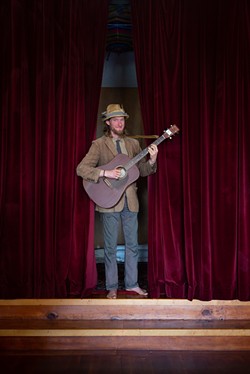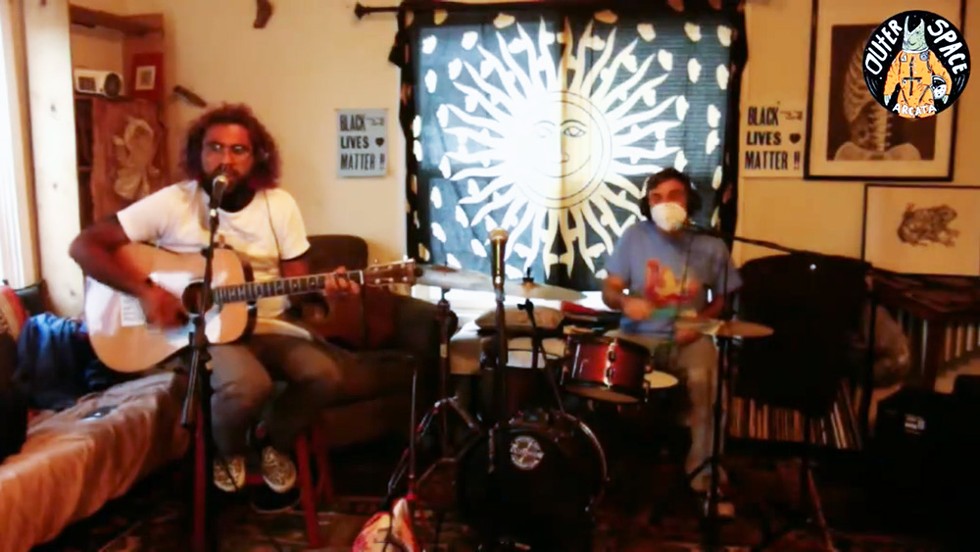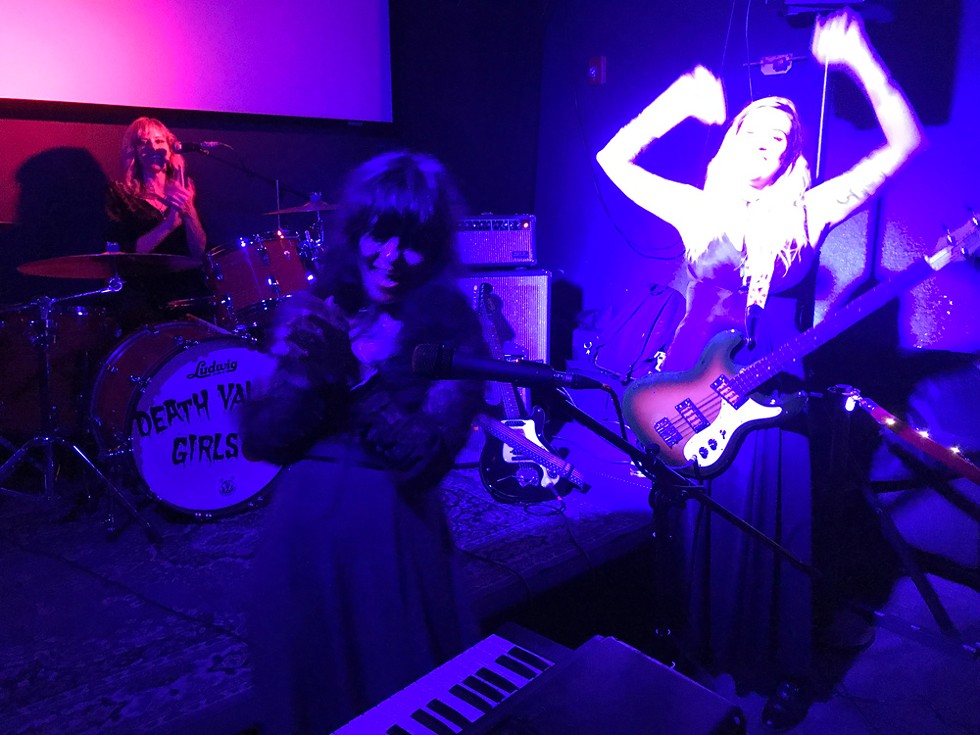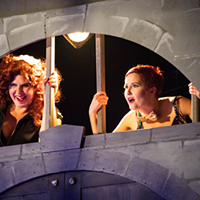[
{
"name": "Top Stories Video Pair",
"insertPoint": "15",
"component": "17087298",
"parentWrapperClass": "fdn-ads-inline-content-block",
"requiredCountToDisplay": "1"
}
]
Sometime in the first three months of 2020, nearly every musician in Humboldt County played their last live gig. It's difficult to pin down the exact date of the general venue closures due to the COVID-19 pandemic but St. Patrick's Day is a good hinge, a pivot point where venue owners and employees had to calculate the safety of staying open during a very busy and boozy holiday. There's a superstitious temptation to place the date at the preceding Friday the 13th, or perhaps two days later, the Ides of March, whose ancient association with the murder of Julius Caesar has given it an augury of evil. In truth though, there isn't one set date when the live music went away, just a series of closures that fully metastasized by April of 2020. I spoke with a number of people who were directly affected by the closures in an effort to understand what a year of living without the live stage has been like for the people who make that stage matter.
One such artist is the singer, pianist and piano teacher Lorenza Simmons-Phillips. Like nearly everyone I spoke to, she remembers her last live gig, sharing the stage at the Arcata Theatre Lounge with Tarrus Riley on Feb. 6, 2020, a night celebrating Bob Marley on the late singer's 75th birthday. Since then she has focused on her job as a teacher of voice and piano for ages 3 and up, both privately and through the Humboldt Music Academy and Alder Grove Charter School. Like most teachers she has been working through the challenge of remote instruction, but is remarkably upbeat about the process.
"It's definitely not been easy but we've all been doing our best," she said, adding "being at the whim of the internet connection and also not being able to sing and play at the same time as my students is tough. However, I am very impressed by their resilience." She's also devoted time to HC Black Music and Arts Association, teaching somatic movement and music classes for local Black youth, where she's encountered both the same strength and the same need to connect.
Julio Perdido, one half of local garage rock duo Los Perdidos and one of the main forces behind the Outer Space Collective has a similarly positive attitude while echoing some frustrations with the nature of distance technology as it applies to such a live discipline. He hosts an hour-long open mic Outer Space stream on Facebook on Sundays at 7 p.m. but notes, "It's not the same as being in a room with people. I'm getting used to thinking of myself as a musician, because I always felt more like a performer, but being a performer needs a live audience. The hearts and 'likes' are nice but it's not the same." Still, he sets up weekly and plays guitar and sings, sometimes through an N-95 mask, with similarly masked Sean Perdido a few feet away on drums. Other musicians share recorded videos or log on live, playing from couches and bedrooms.
Another streamer is trombonist James Zeller, who now makes weekly appearances on the Sanctuary's J Street Regulars Radio Hour (weekdays at 7p.m. on YouTube and Facebook). A paid gigging musician for 25 years, he misses playing live and is frustrated with California's unemployment system, which in the beginning of the pandemic was useless for working musicians and freelancers in general. But the lack of live music has affected him more than just materially. "I depend on live music from a mental health standpoint. Income is good, it's good to pay your bills and have enough food. For me I don't need a lot to feel happy but if I'm playing and creating music I'm feeling pretty good. What is essential for me is making music." Making a living playing music as Zeller does is rare in Humboldt County, where most work day jobs and play for little or no money aside from tips.
"As I've grown more mature I've realized that making a living is often contradictory to what is good for you," says Zeller. "I really like a phrase I saw on the subway in New York once that said, 'Making a living is doing something that makes you feel alive.' So when I realized that I might not be playing in front of audiences for a while, that was terrifying."
For now live streaming is the best that he has. "I have been really lucky. I was living close to the Sanctuary when a room opened up and I was able to move in here. I started doing live streams right away. It's not my favorite thing in the world but it gives me something to work towards, organizing a set two to three times a week. I have to play music everyday. A lot of local musicians that I've talked to are not playing at all."
Zeller notes that while some musicians are suffering from a lack of inspiration, others are thriving creatively in the unusual circumstances. He mentions that some groups, like fellow J Street live streamers Canary and the Vamp, who share a quarantine pod, are using the time well. Streaming has also allowed him to experience a collaboration that would likely not have happened otherwise. "Here's a silver lining: Jennifer Trowbridge, who is a world-class classical guitarist, teaches at Humboldt State University. I reached out to her and we played a great socially distanced set together."
Some bands, however, have had a difficult time adjusting to the new requirements of isolation.
Sue and the Namis, one of many bands Perdido plays with, is on a hiatus as a result of the pandemic. "It just felt like half of the band wasn't on the same page with what we felt comfortable with in terms of safety. It got exhausting asking people if they had been careful and if they were getting tested if they had more outside social contact."
Psych-rockers White Manna, one of the more prolific touring bands in the county, were forced to cancel an extensive European tour which was booked for October of 2020. Drummer Tavan Anderson, who also plays in local post punk band CV, didn't play much music at all in 2020."It was boring, it was a drag, man," he says. "I've found it difficult to keep up. I haven't really been getting together with anybody to jam because people in my life have medical conditions and I can't risk it. And it's not just musicians, people maybe don't realize how extensive this whole thing is. I'm talking about sound techs, drivers, promoters. This has just flattened an entire industry of people."
White Manna guitarist and singer David Johnson expressed a similar sentiment, except in regard to playing live. "I feel that several very key conditions need to happen to have live shows and, for the most part, I don't feel there are many places in the world right now that have the tools and resources to execute these thoroughly and securely enough." Still, he sees a potential silver lining coming from the fallout from COVID-19. "Hopefully this shitstorm reality tunnel will cause a great change in the minds of many."
It isn't just musicians who are having difficulties navigating the current landscape. Richards' Goat Tavern and Tea Room and Miniplex owner Aimee Hennessy, who is also Anderson's partner, shared some of the difficulties facing businesses. "Until the pandemic hit, I'd been lucky to carve out a niche for myself as a disabled business owner doing something I'm good at, promoting films and live events," she says. "It's made me think a lot about how many other people in the events industry have highly specialized skills working in sound and lighting, etc., who suddenly have found themselves without prospects for the skills they've worked years to perfect." (Full disclosure: I previously worked at Richards' Goat as a sound engineer and bartender.) Hennessy looks at unemployment benefits for the self-employed as "a good start," considering how many work in the live events industry as independent contractors. But she notes the Shuttered Venue Operators grant, though helpful, covers only six months of losses for a year of shutdown. "I think something similar to the federal restaurant grants, which account for actual losses, will be needed to keep more cultural venues from closing permanently while they wait for the world to be safe for gathering again. I think in reality though, that we will all have to figure things out at a local level. I don't know what that will look like but we're creative here in Humboldt."
Asked about what the future might look like for independent venues, Hennessy outlines the basics of her own struggle as an example. "Since 2015, we've made the vast majority of our food and drink sales during live events and movies, so that's what we were focusing on." Focusing on food sales — like pandemic-friendly comfort food and boozy popsicles — has helped over the last year, but the lack of funds to invest in or advertise the shift has made it tough. "Even for a venue that already serves hot food like we do, you have to convince people who think of you more as a movie theater or karaoke bar to come eat outdoors at completely different hours, while no events are happening." Sales were down 90 percent, she says, even as other businesses were starting to bounce back. "It's an uphill battle," she says. "We are determined to survive this until we can bring bands and karaoke back. We're really grateful to our regulars who have continued to support us while events are on hold, though we understand why some people are not going out at all yet."
Oryan Peterson-Jones, who has toured and recorded extensively around the world, found himself busy during lockdown, recording at the Morris Graves museum, releasing music with his group Die Geister Beschworen, and running for a seat in the Arcata City Council. Like White Manna, he also canceled a lot of live dates because of the pandemic and has a dim view of people who were playing live in front of audiences against state and local guidelines.
"People have such short attention spans, they get bored too easily. That's no excuse for behaving irresponsibly, says Peterson-Jones. "The entertainment industry is America's red right hand. It's always going to thrive off of money and greed." That's no shock to him but he is amazed that musicians would be willing to risk the health and safety of the fans on whom they rely "merely to make a buck or to continue feeling relevant. It's not just petty and selfish, it demonstrates a disconnect, a lack of empathy. And yes, it's entirely unfair to those taking this seriously. I think it's reckless that folks are beginning to treat the pandemic as though it's all in the rearview mirror."
So what does the future hold for the live music scene here and abroad? Most of the interviews for this story were conducted when the county was stuck between the red and purple tiers, before limited seating outdoor performances were allowed. Perhaps surprisingly, many of the people I spoke to, on and off record, are optimistic, if not enthusiastic about the notion of a post-COVID concert landscape.
"I think it's going to be like the 1920s when people can go out and see music again," says Anderson. "I think that things are going to come roaring back when people can go outside and be together again."
"It's hard to know how this will all turn out in the end, because it's difficult to know how it will all play out," says Simmons-Phillips. "I feel we will be able to have more live music and festivals again, but I think with substantial changes in how it all happens. I see a lot more outdoor shows, less packed clubs, halls and stadiums potentially."
Peterson-Jones has a positive, if wry, outlook as well. "Many of the artists and musicians I've spoken with during the pandemic have made good use of their spare time. For better or worse, there's going to be a lot of material that gets released into the wild after the world returns to 'normal,'" he says. "I'm crossing my fingers for another renaissance."
On a recent Friday (not a 13th, happily) I was leaving the grocery store when I ran into trumpeter Nicholas Dominic Talvola, who had an attitude toward this whole thing I found rather surprising and oddly uplifting. He says, "I like the break, to be honest. I find myself playing music in a way that I never have before. The trumpet is an instrument which requires muscle memory — you have to play it every day. And sometimes for shows it seemed like a chore keeping those muscles in shape. Now when I play it's when I want to, what I want to, and I feel like I'm playing better than before. Now when people call me up to jam I have this excuse, but really, I'm enjoying the silence. That's what I tell everyone: I'm enjoying the silence."
Collin Yeo (he/him) lives in Arcata, if you can call a year without live music any kind of living.
Speaking of...
-

Music Tonight: Friday, June 28
Jun 28, 2024 -

Zero the Hero
Jun 27, 2024 -

Music Tonight: Wednesday, June 26
Jun 26, 2024 - More »
more from the author
-
Music Tonight: Tuesday, July 2
- Jul 2, 2024
-
Music Tonight: Saturday, June 29
- Jun 29, 2024
-
Music Tonight: Friday, June 28
- Jun 28, 2024
- More »
Latest in News
Readers also liked…
-
Through Mark Larson's Lens
A local photographer's favorite images of 2022 in Humboldt
- Jan 5, 2023
-
'To Celebrate Our Sovereignty'
Yurok Tribe to host gathering honoring 'ultimate river warrior' on the anniversary of the U.S. Supreme Court ruling that changed everything
- Jun 8, 2023



































